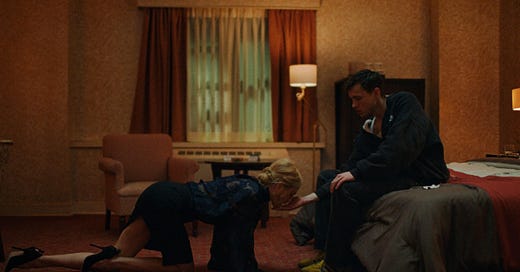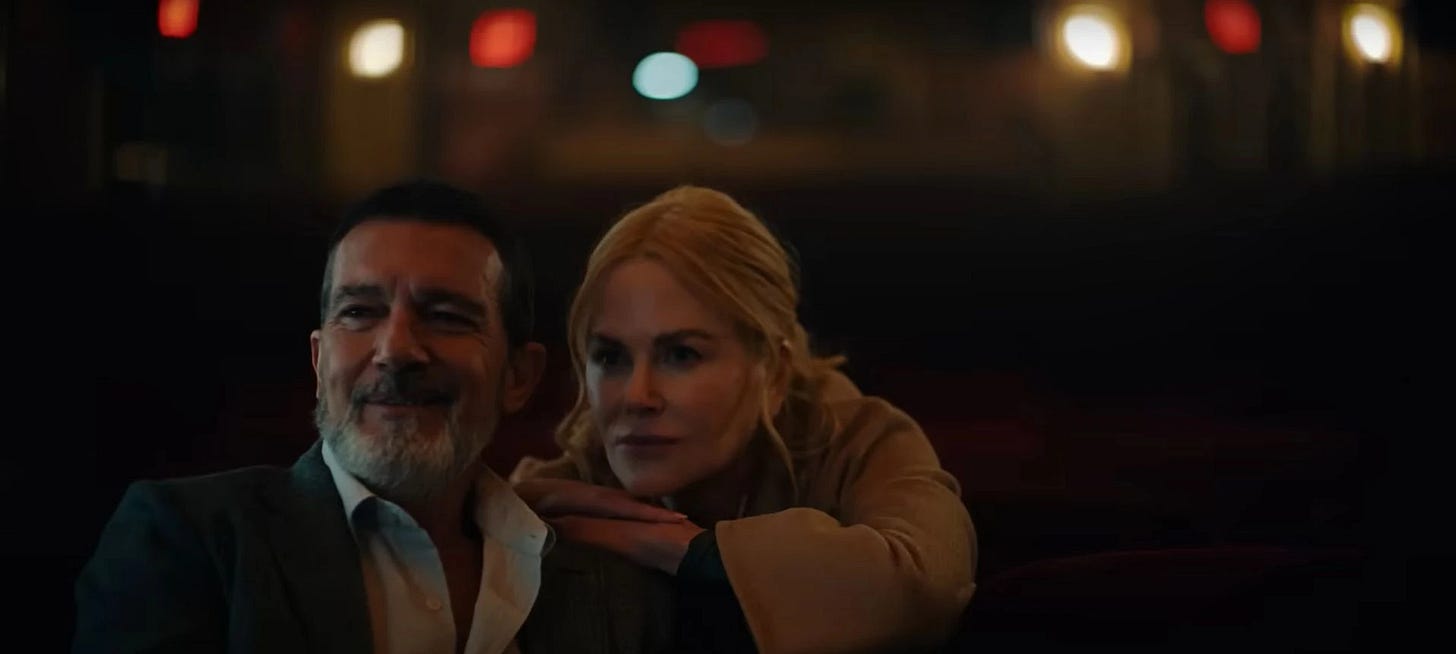‘Babygirl’ and The Character Vacuum
Part of a story’s job is to make you care about the characters.
NEW STANDARD DISCLAIMER: This newsletter aggressively spoils things.
There was an old joke in an obscure 1994 film called PCU, set at a college campus where political correctness (PC) had run rampant1. This is perhaps the most 1990s plot ever conceived, but the movie actually isn’t half bad, and there is one brilliancy in there: The Caine-Hackman Theory. In the film a student is writing his thesis on proving that at any given moment, somewhere in the world a film starring either Michael Caine or Gene Hackman is on television2. It’s kind of hilarious (and ends with the student discovering the one film where both actors appear).
The modern version of the Caine-Hackman Theory would probably be the Nicole Kidman Theory: The belief that at any given time something starring Nicole Kidman, probably made within the last few years, is being broadcast somewhere3. Considering she’s appeared in 34 projects since 2015 (with six more in production right now!) it certainly feels true. The woman has been on a tear, and appears reluctant to take time off from her job. I don’t blame her—she has her reasons, all of which are likely legitimate—but the fact is that Nicole Kidman has become omnipresent in our pop culture4.
This has led to some erosion of her star power in the sense that it’s terribly difficult to get excited about a new Nicole Kidman project, since there will be six more by tomorrow. So when something like Babygirl breaks through and gets some traction, there has to be a reason. In this case, that reason is pretty typical: Sex5. The film’s about a buttoned-down, high-powered CEO, Romy, (Kidman) with a repressed/buried submission kink who engages in an ill-conceived sexual affair with an intern, Samuel, (Harris Dickinson) who has the precise dom energy she’s been secretly craving for decades6.
It’s a pretty good, not-great movie. While the story is interesting and the kink stuff is handled surprisingly well, it just fails to really grab your attention. There’s a simple reason for that: The kink is literally all we know about these characters.
I Think You Like to Be Told What to Do
The premise here is pretty solid, and the casting is on point (even if Dickinson is a little old to be an intern7). The story immediately finds its conflict: Kidman’s CEO is taking an enormous risk with her career and family by getting involved with this kid, but after years of faking it with her husband (a blank Antonio Banderas8) she simply can’t resist the knee-shaking orgasms the kid gives her.
All well and good, and there’s some fun stuff in there. But making an audience care about a film starts with making us care about the people in the film—we have to feel their losses and wins. Yet we’re giving almost nothing about Kidman’s character or Dickinson’s character (or anyone else, for that matter). We know two things about the lead characters and one thing (if we’re lucky) about everyone else (the main thing we know about Banderas’ husband Jacob is that he can have sex with someone for decades, apparently, and never notice that she creeps off to masturbate gloomily after he finishes. Or does notice and simply figures that’s how ladies roll9).
I’m not suggesting that any non-vanilla sexual kink requires some kind of tragic backstory. Perfectly normal and happy folks have fetishes, and some of those fetishes are messy10. But the way the characters are left as blank slates leaves us with little reason to care about their interactions. Who cares if Jacob leaves Romy when he learns about the affair? Or if he’s willing to give Romy what she wants in bed? Or if Samuel destroys Romy’s career? These aren’t people. They’re very specific and narrow archetypes11.
Do You Always Have Cookies?
I do credit the story with being smart about the whole scenario: Samuel could have been written as a rabbit-boiling villain, and Romy’s fetish could have been presented as a life-destroying corruption. Instead, it treats them as flawed human beings engaged in a relationship dynamic that’s a bit unhealthy, and explores the way unmet desires and needs creep up and get a hand on you12.
That’s interesting! It’s just painted on a generic canvas composed of one color for each character. There are hints here and there: Romy at one point says “I was named by a guru” and “I was raised in cults and communes.” Which sounds just like the kind of fascinating backstory a character needs to really get under the audience’s skin! And then we learn ... absolutely nothing else13.
Similarly, at one point Samuel talks briefly about his father, who sounds really interesting, assuming Samuel was being truthful at that moment. A little more about Sam’s life, family, and background would make him into an actual human being instead of just a catalyst for Romy’s sexual Chaos Period.
Sex will always get critical attention, of course, which is why I’ve been working on my own Sex Book for years now14. I figure at this stage of my career the only way I’ll ever be truly famous is to win all the Bad Sex Writing Awards.
NEXT WEEK: Hacks and the unhealthy character loop
If you enjoy this newsletter, consider subscribing to my paid fiction Substack, Writing Without Rules: From the Notebook!
I remember when not being politically correct was supposed to be a form of rebellion. Yes, we all grew up in stupid times.
That is also a very 1990s kind of thing. Kids today don’t know what it was like growing up with 3 main channels and like 5 lesser channels that just ran old movies all the time.
And she’s probably playing a sexually frustrated middle-aged woman.
As for me, if I could earn just one Kidman’s paychecks I’d retire and never leave the house again. When my body is finally discovered, I’ll be entered into the record books for Longest Fingernails.
If I could write a plausible sex scene I’d be one of them bestselling authors, I swear.
Why are stories about repressed women always set in the BDSM sphere? Why can’t Nicole Kidman want to be a Furry? Twist ending: The final encounter is at the Overlook Hotel. I am a genius.
There’s definitely some Hello, Fellow Kids energy here.
Unfairness is the fact that a blank Antonio Banderas is still 105% more charming than I’ll ever be.
If I ever figure out how the ladies roll, I will be sure to announce it. Until then, assume I am confused all the time and you can’t go wrong.
Sometimes literally. BAZINGA.
The fact that characters are not, actually, people and so you as an author are free to torment them is the unspoken dark side of writing. When I write a novel I’m sitting on a throne of vaguely-sketched skulls.
For example, when I was twelve my father refused to let me sip his whiskey, thus setting me on a path where I was determined to drink all the whiskey in the world, and here we are. That’s my villain origin story.
It’s like when you’re 23 and dramatic and you call up a friend to say you’re depressed but then refuse to tell them any of the details. That’s the energy here.
Yes, yes, people die in my sex book, why do you ask?







So... I gather that you don't like milk. Shelly Berman has a bit to say about buttermilk on his first LP. It's on YouTube, if you're interested.